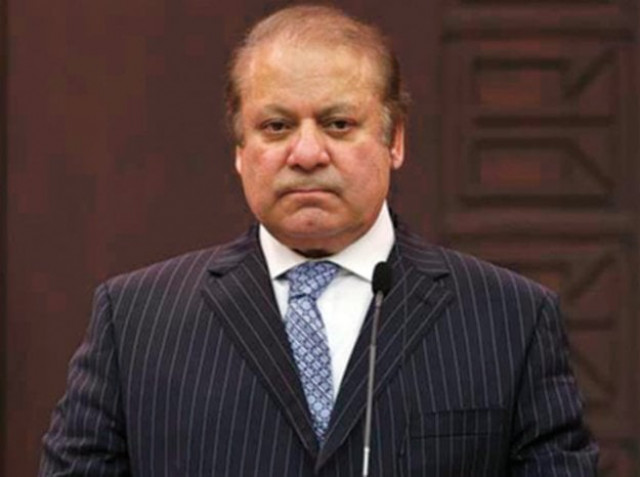Disqualification is not for life, contends Sharif
Former PM tells court not interested to defend election law that enables him to become party head

Former Prime Minister Nawaz Sharif. PHOTO: REUTERS
He stated this in a written statement in the matter related to the interpretation of Article 62 (1)(f) of the Constitution.
A five-member bench of the apex court – headed by Chief Justice of Pakistan Mian Saqib Nisar and comprising Justice Sheikh Azmat Saeed, Justice Umar Ata Bandial, Justice Ijazul Ahsan and Justice Sajjad Ali Shah – has taken up 17 appeals against the disqualification of lawmakers.
Article 62(1)(f), which sets the precondition for a member of parliament to be ‘sadiq and ameen’ (honest and righteous), had provided the grounds for the disqualification of the former premier from holding public office in the July 28, 2017, judgment on the Panama Papers case handed down by the apex court.
The bench had issued a notice to the former prime minister. In response to the notice, his representative Azam Nazeer Tarar appeared before the court on January 31, and sought time to file a reply after consulting the party leadership.
Sharif on Tuesday submitted a two-page statement before the Supreme Court, wherein it is stated, “I (Nawaz Sharif) deliberated the issue with party leadership and it feels appropriate that since this Court has taken up the matter on the motion of many other aggrieved parties, having stakes in the issue, therefore my joining of the proceedings at this juncture before this bench may prejudice their cases. Therefore, in peculiar facts and circumstances, I don’t wish to be part of the captioned proceedings.”
“It is respectfully submitted that if I were to be a party to the original proceedings, I would have requested Mr Justice Azmat Saeed and Mr Justice Ijazul Ahsan, to kindly recuse themselves from the bench as they have already rendered a judgment regarding the issue of my qualification as a member of Parliament and have expressed their opinions about my person on a number of occasions, therefore it would be unfortunate if they were to again decide on the issues keeping my person in their view.
“Be that as it may, in my understanding it is well settled by now that to take part in election process is a fundamental right and therefore no perpetual disqualification can be imposed on someone by interpreting Article 62 of the Constitution of Islamic Republic of Pakistan. A time limit could have been provided by the Parliament but since it has not been done so, the issue of qualification under Article 62 is confined only to the election in question. I being a strong proponent of democracy believe that it is the right of people of Pakistan to participate in the process of election and to reject or elect candidate(s) of their choice. They enjoy an inalienable right to elect their representatives through a true democratic process and not be given the list of selective people through the process of elimination,” says the statement.
Major political parties – including the PPP and the PTI – challenged the Elections Reforms Act 2017, which paved the way for Sharif to become party head again after his disqualification from holding political office under Article 62 (1) (f) of the Constitution.
Meanwhile, Tarar told the Supreme Court that Sharif is not interested in engaging a counsel to defend the election law that paved the way for him to become party head.
Tarar states that Sharif feels that his party elected him as party head and it is a matter of the PML-N and parliament to defend the law.
The bench decided to proceed ex parte against Sharif in the matter. They, however, offered that if he desires, he may join the proceedings at any time.
During the hearing, the CJP observed that mala fide is not the ground to strike down the law.
Justice Ijazul Ahsan said it was a unanimous decision that Sharif was dishonest.
While referring to Article 63, he wondered, “How a person, who has been declared dishonest, can control honest people,” adding, “Can he be allowed to become party head?”
He also observed that if a person cannot become king, he can become a kingmaker.
Barrister Dr Farogh A Nasim, counsel for Awami Muslim League (AML) Chief Sheikh Rashid, stated that the law was a mockery of the Constitution and the Panamagate judgment.
“How is the law violating the Constitution?” the bench asked. The chief justice asked Nasim not to plead the National Assembly and the Senate as party in the matter.
“I have great respect for parliament. I have given respect to parliament even in the 18th and 21st constitutional amendments case,” he added.
The CJP said if they feel necessary then they may ask the National Assembly secretary to submit details regarding the parliamentarians’ debate on the specific provision of election law.
He said, “Parliament is supreme to make laws but subject to the restriction of the Constitution.”
The hearing will continue on Wednesday.



















COMMENTS
Comments are moderated and generally will be posted if they are on-topic and not abusive.
For more information, please see our Comments FAQ